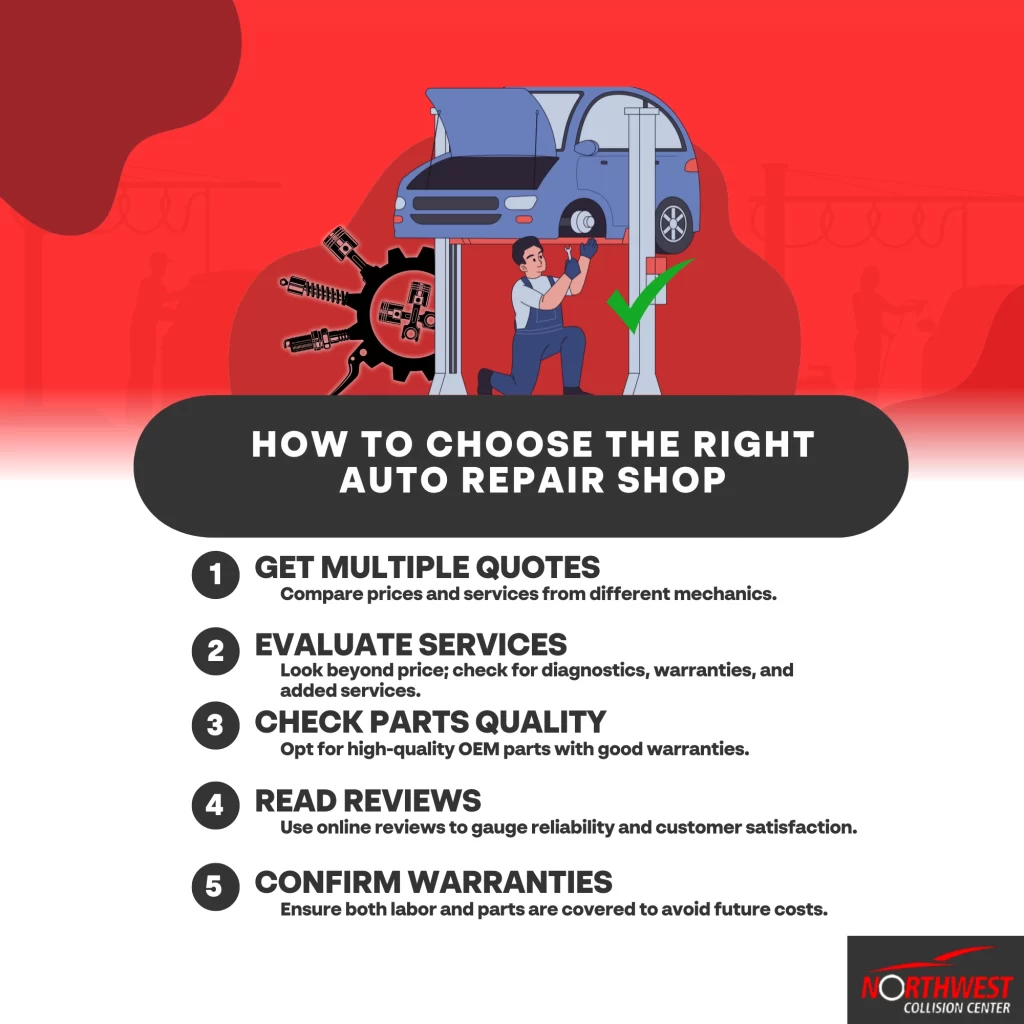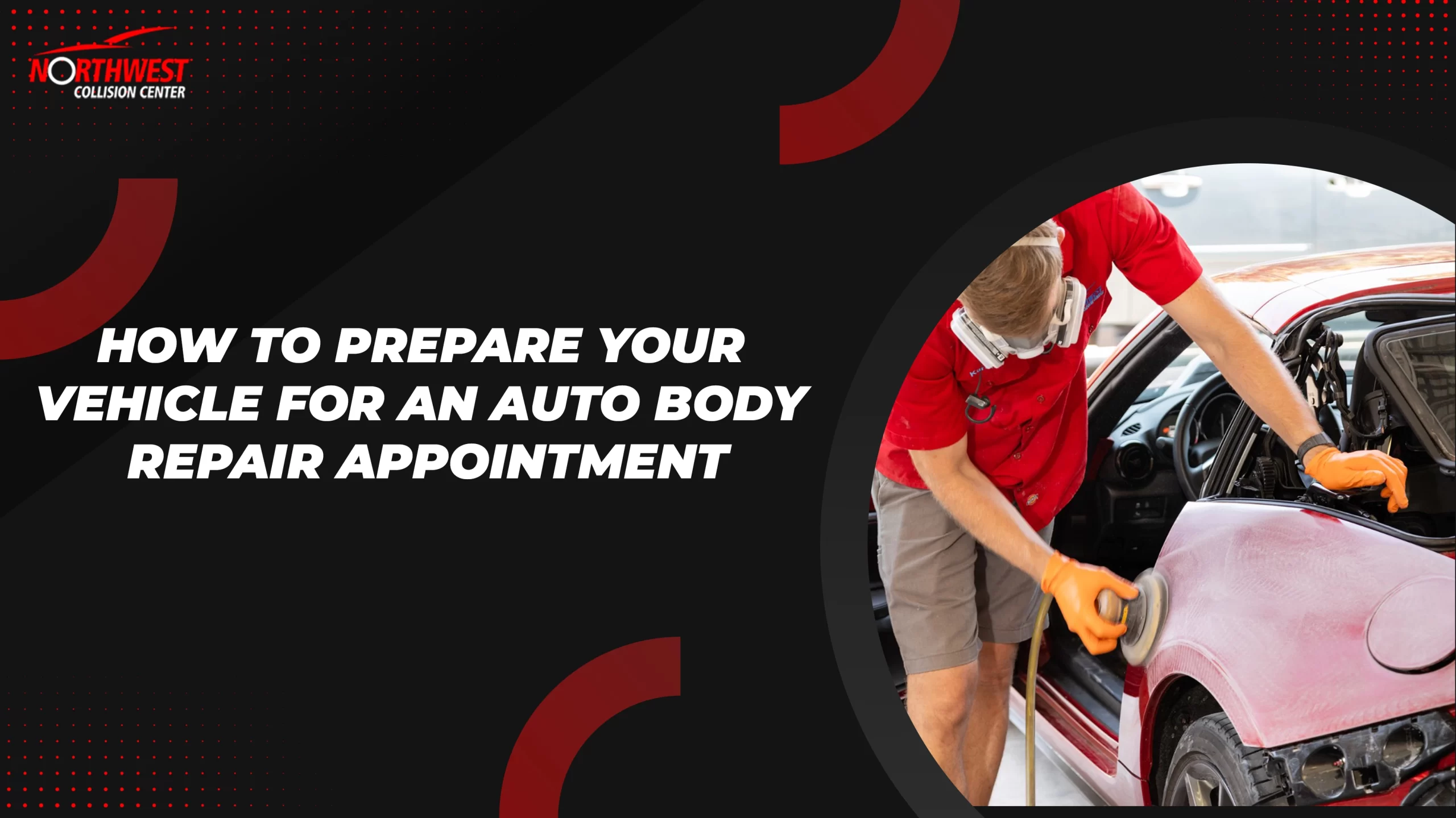When comparing auto repair quotes, start by gathering multiple estimates from trusted mechanics to get a fair price range. Evaluate the services each quote includes, like diagnostics and warranties, to guarantee you’re getting good value. Check if they use high-quality parts, preferably OEM, and look for warranties on both parts and labor. Read online reviews to gauge customer satisfaction and shop reliability. Finally, confirm the details of any warranties to avoid unexpected costs. By following these steps, you’ll be better equipped to choose the right repair shop for your needs, and there’s more to learn about assuring quality auto repairs.

Key Takeaways
- Gather multiple quotes from different service providers to compare pricing and services.
- Evaluate additional services included in quotes, such as diagnostics, labor charges, and warranties.
- Check the quality of parts used, distinguishing between OEM and aftermarket options.
- Utilize online reviews on platforms like Google and Yelp for insights into service reliability.
- Confirm warranty details for both labor and parts to ensure comprehensive coverage.
Gather Multiple Quotes
To guarantee you get the best deal on auto repairs, it’s essential to gather multiple quotes from different service providers. This approach isn’t just about finding the lowest price; it’s about making sure you’re working with a reliable and skilled mechanic. Start by asking friends, family, or colleagues for recommendations on how to find a good mechanic. Personal referrals often lead you to trustworthy professionals who have a track record of honest and quality service.
Next, use online resources to widen your search. Websites like Yelp, Google Reviews, and the Better Business Bureau can provide insight into a mechanic’s reputation and reliability. Look for mechanics with consistently high ratings and positive feedback. This is a strong indicator that they’re transparent and skilled in their trade.
When you’ve shortlisted a few mechanics, visit their shops in person. Pay attention to the cleanliness and organization of the workshop, and don’t hesitate to ask questions about their experience, qualifications, and the types of vehicles they specialize in. By gathering multiple quotes and evaluating each mechanic’s credibility, you’ll be better positioned to make an informed decision, ensuring both quality and affordability in your auto repairs.
Compare Services Offered
When comparing services offered by different mechanics, guarantee you’re looking beyond just the basic repair costs to understand the full range of services included in each quote. It’s essential to recognize that a lower price may not always mean the best value. Some garages might include additional services, such as a thorough inspection, fluid top-ups, or even a car wash, which can save you money in the long run.
To find the best place for car service, pay attention to whether the quote covers diagnostic tests, labor charges, and any potential additional services. These extras can greatly affect the final price and overall experience. Make sure to ask if the quote includes a warranty on the repairs, as this indicates confidence in their work and can provide peace of mind.
Also, check if the mechanics offer any complimentary services or discounts, such as free towing or a courtesy vehicle while your car is in the shop. These perks can make a big difference, especially if your car needs extensive repairs. By thoroughly comparing the services offered, you’ll be better equipped to choose the best place for car service that meets both your budget and your vehicle’s needs.
Evaluate Quality of Parts
While comparing services is significant, evaluating the quality of the parts used in repairs is equally vital to secure your vehicle’s longevity and performance. High-quality parts can save you from frequent breakdowns and additional expenses in the long run. Here’s how to ascertain you’re getting the best parts for your vehicle:
- Ask About OEM vs. Aftermarket: Original Equipment Manufacturer (OEM) parts are made by the car’s manufacturer and generally offer the best fit and performance. Aftermarket parts can vary in quality, so it’s important to ask your mechanic which type they use and why.
- Check Part Warranties: Quality parts often come with warranties. A good mechanic will provide this information upfront. Look for parts with longer warranties, as they typically indicate better durability and performance.
- Research Part Brands: Not all parts brands are created equal. Familiarize yourself with reputable brands for your specific vehicle. You can find plenty of reviews and comparisons online to guide your decision.
- Inquire About Part Sourcing: Ask your mechanic where they source their parts. Reliable suppliers are less likely to sell counterfeit or substandard products. A good mechanic should be transparent about their sources and quality control processes.
Check Shop Reviews
Don’t underestimate the power of online reviews when it comes to choosing an auto repair shop. These reviews can offer invaluable insights into the experiences of other customers, helping you find reliable mechanics near me. Start by checking popular review platforms like Google, Yelp, and the Better Business Bureau. Pay attention to both the overall rating and the number of reviews. A high rating with many reviews is often a good indicator of consistent quality.
Read through the comments to identify common themes. Are customers frequently praising the shop for its transparency and professionalism? Or are there recurring complaints about overcharging and poor workmanship? Look for specifics about the type of repairs done, the quality of parts used, and the customer service provided. This will give you a clearer picture of what to expect.
Don’t just rely on the star ratings alone; the detailed reviews can reveal how the shop handles issues and customer complaints. A shop with reliable mechanics near me will often respond to reviews, showing their commitment to customer satisfaction. By doing your homework, you’ll be better equipped to choose a shop that meets your needs and offers fair, transparent quotes.
Confirm Warranty Details
Before committing to a repair shop, it’s crucial to verify the warranty details on both labor and parts to assure you’re protected against future issues. Understanding the warranty terms can save you from unexpected costs down the line and is a critical step in how to find a good mechanic.
Here are four key points to reflect on:
- Duration and Coverage: Ask how long the warranty lasts and what it covers. Standard coverage might range from 90 days to a year, but some shops offer extended warranties for specific parts and services.
- Labor Warranty: Confirm that the labor warranty covers any workmanship errors. This means if the repair wasn’t done correctly the first time, the shop will fix it without additional charges.
- Parts Warranty: Verify if the parts used are covered by a manufacturer’s warranty or if the shop provides its own coverage. High-quality parts often come with longer warranties, which is a sign of a good mechanic.
- Claim Process: Understand the process for making a warranty claim. Ask if you need to return to the original shop or if the warranty is honored at other locations.
Verifying these details guarantees you’re making an informed decision and can trust the repair shop you choose.
Conclusion
Remember, gathering multiple quotes can save you up to 30% on car repairs. By comparing services offered, evaluating the quality of parts, checking shop reviews, and confirming warranty details, you’re guaranteeing the best value for your money and peace of mind. Don’t rush the process; a little extra effort now can prevent costly mistakes later. Trust in your ability to make informed decisions and keep your vehicle running smoothly.










